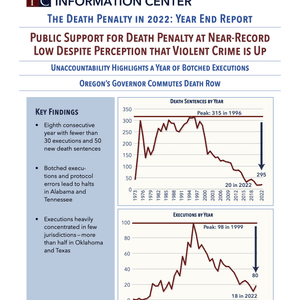An editorial published by the Lexington Herald-Leader noted that support for Kentucky’s death penalty has declined since the state resumed executions a decade ago. The paper stated that 68% of state residents questioned in a recent poll preferred a long prison sentence over execution for those convicted of murder. The Herald-Leader concluded that Kentuckians’ growing unease about capital punishment is reflective of a broader national trend away from the death penalty and that the death penalty is often more a matter of chance than of justice. The editorial stated:
It’s interesting that public support for the death penalty has declined in the almost 10 years since Kentucky resumed executions.
Most Kentuckians still say they support capital punishment. But given the choice of sentencing a convicted murderer to death or a long prison term, 68 percent say prison is the appropriate sentence.
Just 30 percent pick death, according to the University of Kentucky Survey Research Center.
In 1997, support was about equal for the death penalty and a long prison term, at just under 40 percent.
A number of explanations are possible for the shift in public opinion: Mistaken convictions revealed by DNA evidence. A disturbing number of innocent people who independent investigations have discovered on Death Row. (Illinois had so many that it put a moratorium on executions.) Bad press about lethal injection, which was supposed to be more humane.
Or maybe it’s just a growing unease that deciding who lives and dies isn’t a job that government does very well.
Some crimes are so heinous that death seems the only fitting punishment. But after watching the highly imperfect process of deciding who gets death and who doesn’t, most Kentuckians are more comfortable putting a violent criminal away for a long time.
After all, someone who’s mistakenly imprisoned can be set free.
Whatever the reasons, Kentucky seems to be part of a larger trend.
A Gallup Poll earlier this year found that 65 percent of Americans support the death penalty, down from 80 percent in 1994. Given the choice of life without parole as an alternative to execution, more chose life without parole (48 percent) than death (47 percent.)
The number of executions in 2006 was down, even in such bastions of capital punishment as Texas.
Kentucky has executed two people in the 30 years since the death penalty was reinstated, one in 1997 and the other in 1999.
So maybe capital punishment is doomed. The death penalty will become obsolete, at no political risk to anyone, as juries choose long prison terms over death sentences.
That probably would happen if juries in capital cases reflected public sentiment. But they often don’t. Prosecutors use their selection options to empanel juries that are more pro-death penalty than the general public.
Under such circumstances, a sentence of death becomes even more a matter of chance than justice.
That puts more pressure on everyone in the system to get things right.
(Lexington Herald-Leader, January 3, 2007). See Editorials, Public Opinion, and Life Without Parole.
Public Opinion
Sep 03, 2024

Articles of Interest: The New York Times Editorial Board Argues United States “Does Not Need the Death Penalty”
Public Opinion
Nov 15, 2022

